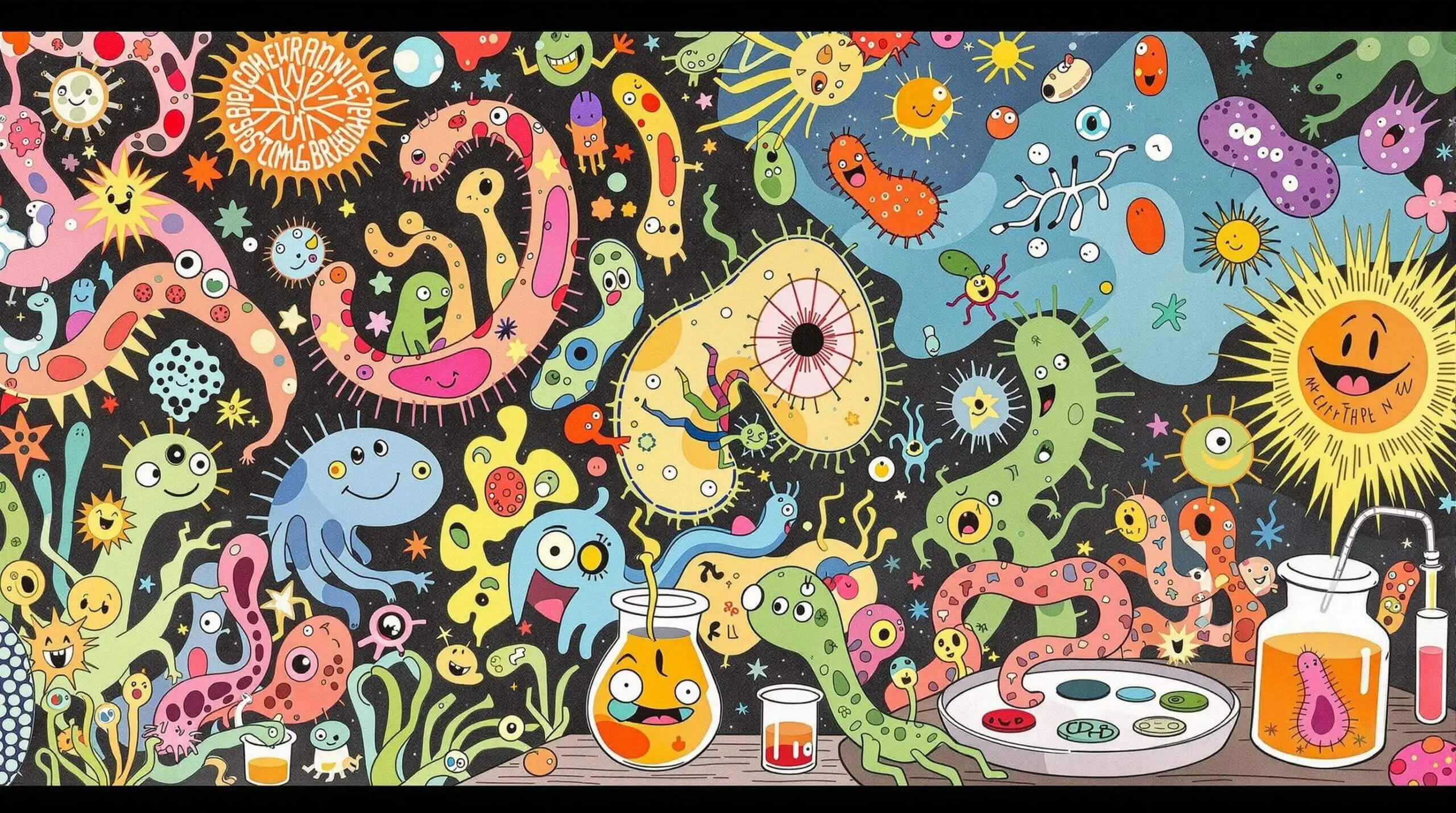Longevity in the Gut: Lesser-Known Bacteria That Matter
Explore the impact of obscure yet vital gut bacteria on human longevity and health.

Understanding the Microbiome’s Hidden Heroes
The Invisible Army in Your Gut
Your gut houses trillions of bacteria, but most people only know about the popular ones like Lactobacillus and Bifidobacterium. The truth is, there’s a vast ecosystem of lesser-known bacterial species quietly working to keep you healthy and potentially extend your life. These overlooked microorganisms might hold the key to understanding why some people age more gracefully than others.
Beyond the Usual Suspects
While probiotic yogurt labels might spotlight familiar bacterial names, research shows that species like Akkermansia muciniphila and Faecalibacterium prausnitzii play crucial roles in longevity. These bacteria strengthen your gut barrier, reduce inflammation, and help maintain a healthy metabolism – all vital factors in aging well.
The Evolution of Gut Research
Scientists have made remarkable discoveries about gut bacteria in recent years. Advanced DNA sequencing has revealed hundreds of new bacterial species, each with unique functions. Some produce compounds that protect your brain, while others help maintain your immune system. The field has moved from simply counting bacteria to understanding their complex interactions with human health and aging.
Common Misunderstandings
Many believe that all bacteria either good or bad. Reality is more nuanced. Some bacteria, like Escherichia coli, can be beneficial in small amounts but harmful in large quantities. Another misconception is that probiotics alone can fix gut problems. Research shows that feeding existing beneficial bacteria through diet might be more effective than introducing new ones.
Research Findings
Studies paint a compelling picture: people who live past 100 often have more diverse gut bacteria than younger adults. Research from the University of California found that certain bacterial species increase by up to 300% in centenarians compared to younger adults. These bacteria produce specific compounds linked to reduced inflammation and better metabolic health.

Key Players in Gut Longevity
Akkermansia muciniphila: The Weight Controller
This bacteria deserves special attention. Studies show that higher levels of Akkermansia correlate with better metabolic health and slower aging. It helps maintain the gut barrier and regulates body weight. People with abundant Akkermansia often have better insulin sensitivity and lower inflammation levels.
Christensenella: The Genetic Connector
Recently discovered Christensenella has strong genetic links – it tends to run in families. Research indicates that people with high levels of this bacteria often maintain healthier body weights and show slower aging markers. It’s particularly interesting because it appears to influence how other beneficial bacteria grow.
Supporting Your Gut’s Lesser-Known Heroes
Dietary Strategies for Bacterial Balance
Specific foods can encourage the growth of beneficial bacteria. Polyphenols found in berries, dark chocolate, and green tea support Akkermansia growth. Resistant starch, found in cooled potatoes and rice, feeds bacteria that produce butyrate, a compound linked to longevity.
Environmental Factors
Your environment affects your gut bacteria significantly. Exercise increases beneficial bacterial species by up to 40%. Stress reduces bacterial diversity, while good sleep promotes it. Even exposure to nature can introduce beneficial microorganisms that support gut health.
Critical Factors
Several elements influence your gut bacterial composition. Medication use, especially antibiotics, can dramatically alter bacterial populations. Age, diet, and lifestyle choices create unique bacterial profiles. Understanding these factors helps maintain optimal gut health for longevity.
Supporting Your Gut’s Hidden Heroes
- Eat diverse fiber sources daily
- Include fermented foods in your diet
- Limit artificial sweeteners
- Exercise regularly
- Manage stress effectively
- Get adequate sleep
- Avoid unnecessary antibiotics
- Consume polyphenol-rich foods
- Stay hydrated
- Spend time in nature
Emerging Research and Future Directions
Scientists are developing new ways to analyze and support beneficial gut bacteria. Recent studies focus on bacterial metabolites – compounds produced by bacteria that affect human health. Research suggests these metabolites might be more important than the bacteria themselves.
New studies explore how specific bacterial strains influence aging. Some bacteria produce compounds that mimic the effects of calorie restriction, a well-known longevity promoter. Others help maintain telomere length, a key marker of cellular aging.
Practical Applications
Current research translates into actionable steps. Regular consumption of polyphenol-rich foods supports beneficial bacteria. Periodic fasting might help reset gut bacterial populations. Simple lifestyle changes can significantly impact your gut’s bacterial composition.
Monitoring and Maintaining Gut Health
Testing and Analysis
Modern testing methods can identify your gut bacterial composition. While not necessary for everyone, these tests provide insights into your microbiome‘s health. They can reveal whether you have adequate levels of beneficial bacteria and highlight areas for improvement.
Long-term Maintenance
Maintaining healthy gut bacteria requires consistent effort. Regular exercise, stress management, and proper sleep support beneficial bacterial growth. Periodic reassessment helps track progress and adjust strategies as needed.
Essential Nutrients for Gut Bacteria
- Prebiotic fibers from vegetables and fruits
- Polyphenols from berries and tea
- Omega-3 fatty acids
- Zinc and other minerals
- B vitamins
- Vitamin D
- Antioxidants
- Plant-based proteins
- Complex carbohydrates
- Essential amino acids
Special Considerations and Challenges
Age-Related Changes
Bacterial diversity typically decreases with age. However, certain interventions can help maintain or restore beneficial bacteria. Regular physical activity and a varied diet become increasingly important as you age.
Individual Variations
Genetic factors influence gut bacterial composition. What works for one person might not work for another. Personal experimentation and attention to how your body responds to different interventions helps optimize your approach.
Environmental Challenges
Modern life presents challenges to gut health. Processed foods, stress, and environmental toxins can disrupt bacterial balance. Understanding these challenges helps develop effective countermeasures.
Optimizing Your Gut for Longevity
Daily Practices
Simple daily habits support beneficial gut bacteria. Eating a variety of plant foods, managing stress, and staying physically active create an environment where beneficial bacteria thrive. Small, consistent actions often yield better results than dramatic short-term changes.
Long-term Strategy
Supporting gut health requires a long-term perspective. Focus on sustainable habits rather than quick fixes. Regular monitoring and adjustment of your approach ensures continued progress.
Your gut bacteria play a crucial role in how well you age. Understanding and supporting lesser-known beneficial bacteria through diet, lifestyle, and environmental factors can significantly impact your health and longevity. Regular attention to gut health, combined with practical daily habits, creates an internal environment that promotes healthy aging. The key lies in consistent, informed choices that support your gut’s hidden heroes.